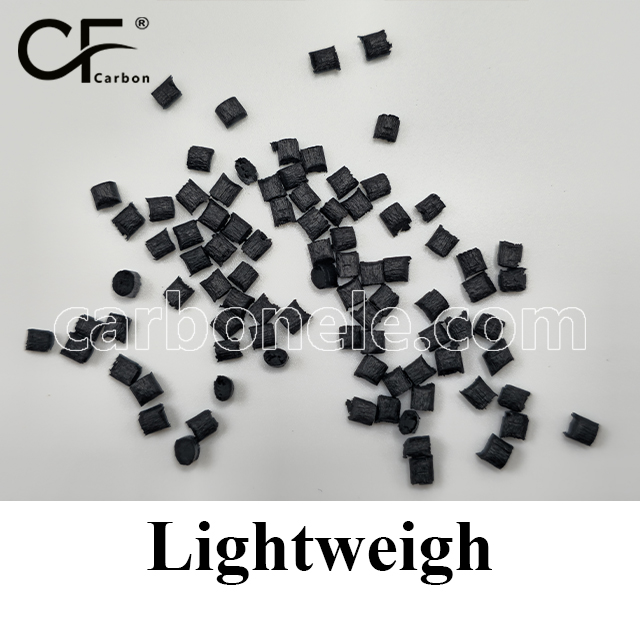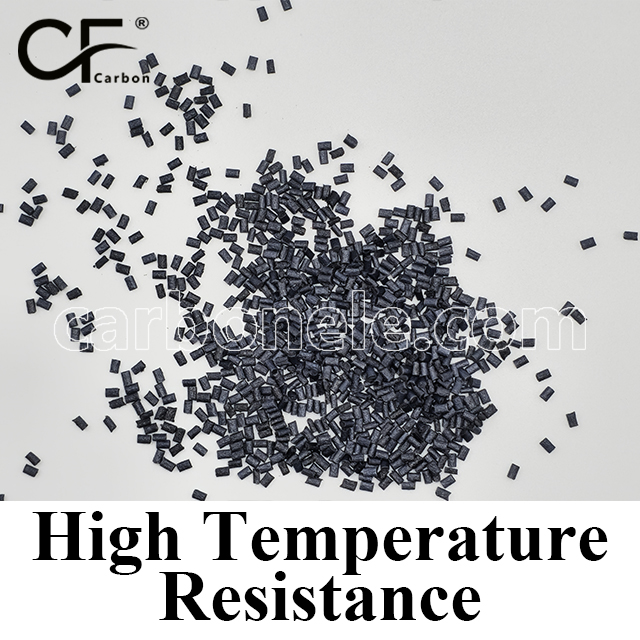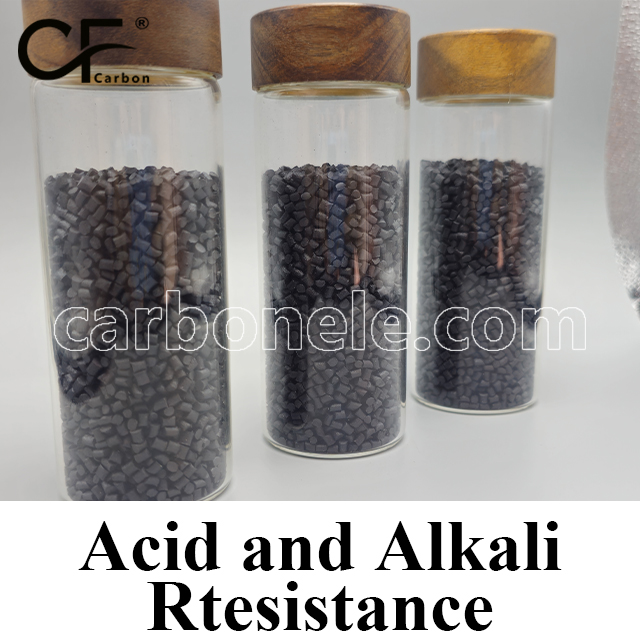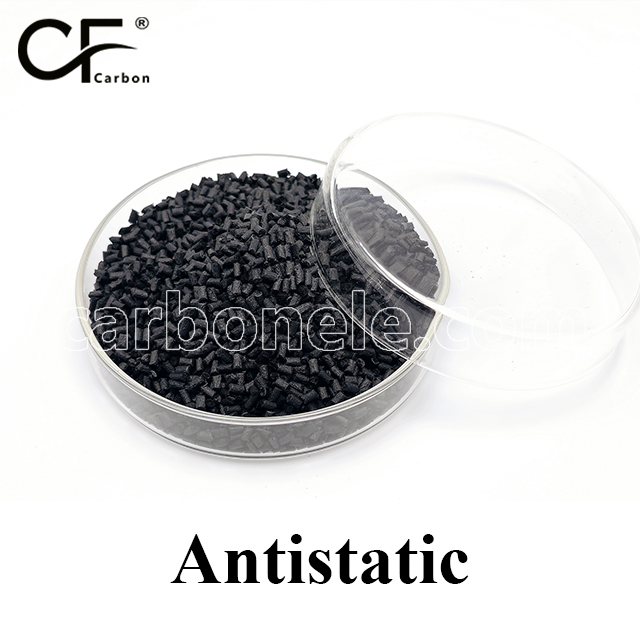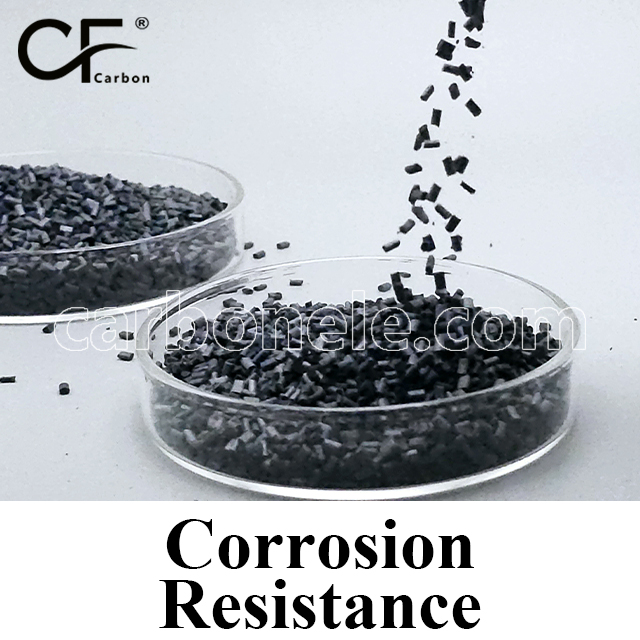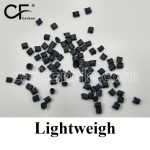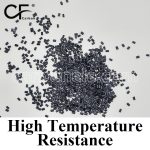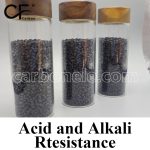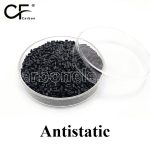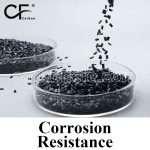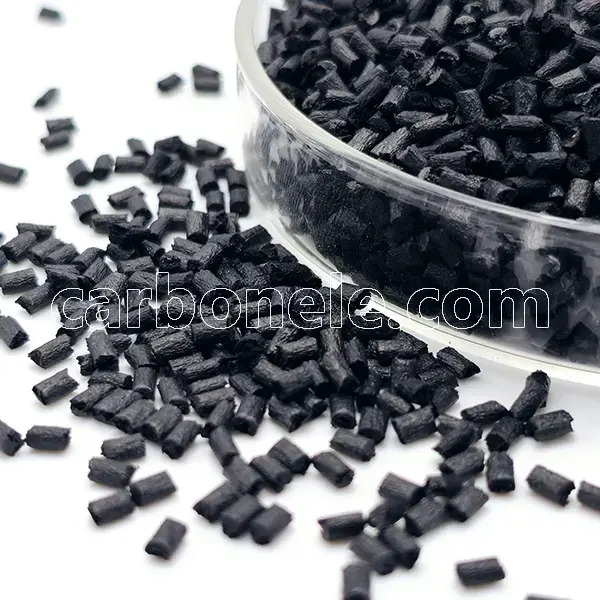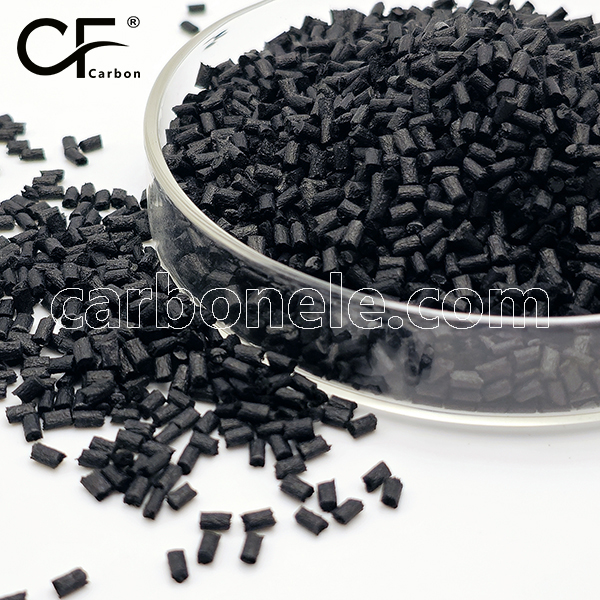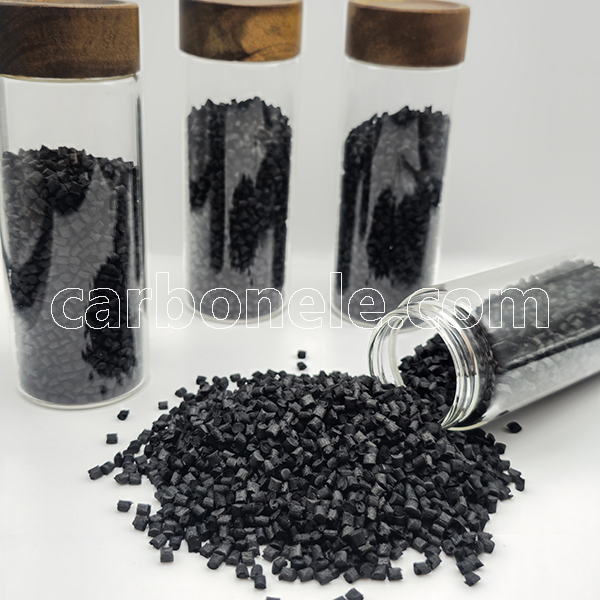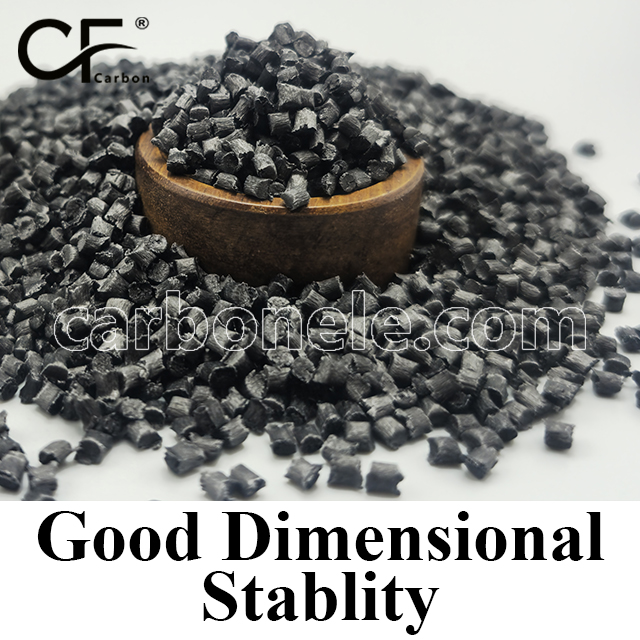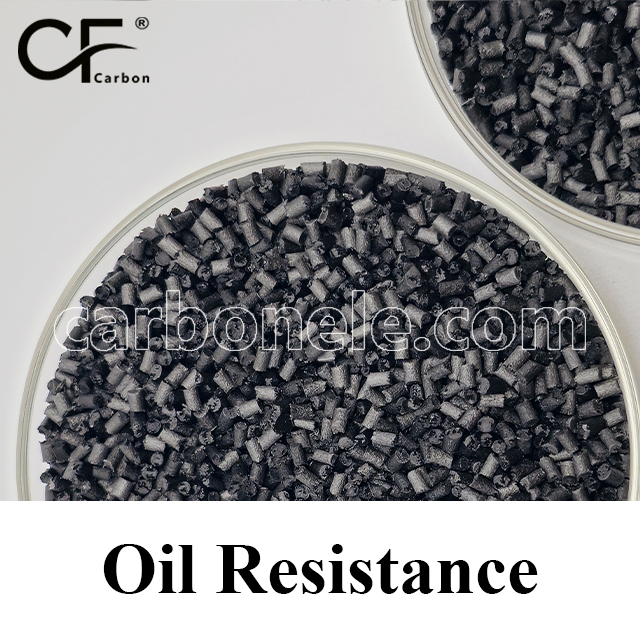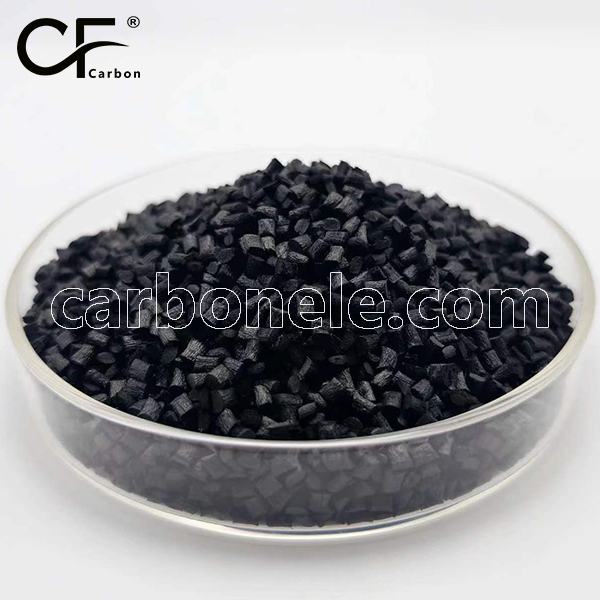PA66-CF60 is an ultra high performance polyamide 66 composite reinforced with 60% carbon fiber, delivering extreme stiffness, superior strength, and outstanding dimensional stability. Designed for the most demanding structural applications, it offers maximum mechanical reinforcement, excellent thermal resistance, and minimal water absorption making it ideal for metal replacement in high load, high temperature environments.

Durable PA66-CF60 carbon fiber blend
- Model number: PA66-CF-BCA6
- Matrix Resin: Nylon6 6(Polyamide66) (PA66)
- Reinforcing Filler: Carbon fiber
- Appearance: Granules
- Grade: Injection/extrusion grade
- Packaging: 25kgs/bag
PA66-CF60: Ultimate Rigidity Carbon Fiber Reinforced Polyamide 66
PA66-CF60 is the pinnacle of high performance polyamide 66 (PA66) composites, reinforced with an ultra high 60% carbon fiber content. It offers unmatched strength, stiffness, and dimensional stability within the PA66 family, making it the material of choice for the most demanding structural and lightweighting applications. While the extremely high filler content poses challenges in processing, PA66-CF60 remains compatible with specialized injection molding and extrusion setups, enabling the production of ultra rigid, precision components.
Key Mechanical Properties
Tensile Strength: ≥ 180 MPa
Flexural Strength: ≥ 280 MPa
Notched Impact Strength: ≥ 14 kJ/m²
The 60% carbon fiber reinforcement yields exceptional load bearing capability, ideal for metal replacement in components subjected to continuous mechanical stress, vibration, or fatigue.
Thermal and Chemical Resistance
Heat Deflection Temperature (HDT): Approx. 160°C
Long Term Service Temperature: Up to 145°C
Chemical Resistance: Excellent resistance to oils, greases, fuels, and weak acids; moderate resistance to alkalis; not recommended for use with strong oxidizers or concentrated acids
PA66-CF60 maintains structural performance in elevated temperatures and chemically aggressive settings.
Wear Resistance and Processing
Wear Resistance: Maximum in the PA66-CF product range
Processing Methods: Injection molding, extrusion (with hardened tooling)
Processing Notes: Requires reinforced processing equipment due to high abrasiveness. Mold design must accommodate limited flowability and ensure fiber alignment for peak performance.
Environmental Adaptability
Water Absorption: Extremely low due to dense fiber network
Dimensional Stability: Exceptional, with minimal warping or expansion under thermal and humidity fluctuations
Ideal for maintaining tight tolerances and precision fits in critical assemblies.
Typical Applications
PA66-CF60 is engineered for structural components where maximum stiffness, mechanical strength, and thermal resilience are required. Target applications include:
Automotive: Structural frame elements, motor and transmission carriers, high load brackets
Industrial Equipment: Load transmitting parts in robotics, heavy duty housings, machine tool spindles
Aerospace & Defense: High modulus, vibration damping lightweight structures
Mechanical Components: Precision wear parts, high strength gears, fatigue resistant supports
Sustainability and Design Flexibility
PA66-CF60 sets a new benchmark in polymer based lightweighting. Its extreme stiffness to weight ratio enables metal substitution in advanced assemblies, cutting down mass while maintaining performance. This leads to energy savings, lower emissions, and longer service life supporting sustainability objectives across multiple industries.
PA66-CF60 Performance Overview
| Property | Value/Description |
|---|---|
| Carbon Fiber Content | 60% |
| Tensile Strength | ≥ 180 MPa |
| Flexural Strength | ≥ 280 MPa |
| Notched Impact Strength | ≥ 14 kJ/m² |
| HDT | Approx. 160°C |
| Long Term Service Temp | Up to 145°C |
| Chemical Resistance | Excellent, except strong acids/oxidizers |
| Water Absorption | Extremely low vs. standard PA66 |
| Processing Methods | Injection molding, extrusion (with special tooling) |
| Wear Resistance | Ultimate in the PA66-CF portfolio |
If you want to get more information about PA66-CF60, you can vist our Youtube.
Strength between PA66 and PA66-CF
Compared to unreinforced PA66, PA66-CF (carbon fiber reinforced) offers significantly higher strength and stiffness. The addition of carbon fiber increases tensile and flexural strength, enhances dimensional stability, and reduces deformation under load. While standard PA66 provides good toughness and impact resistance, PA66-CF materials are better suited for structural and high-stress applications where superior mechanical performance is required.

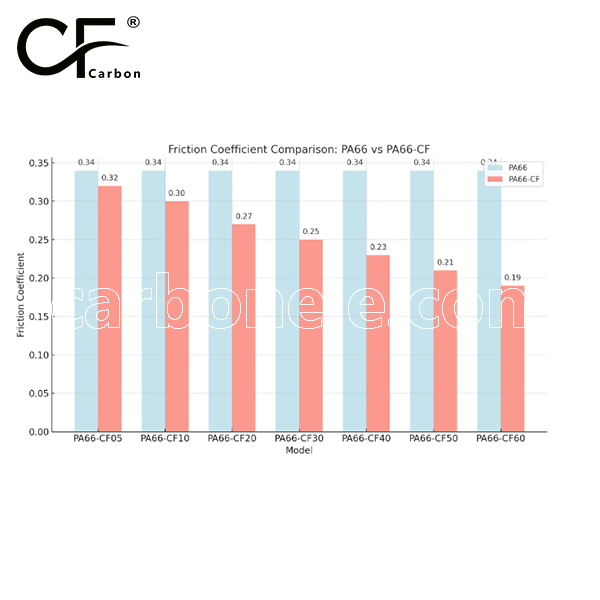

Frequently Asked Questions
Carbon (Xiamen) New Material Co., Ltd. aims to provide buyers with "one-stop" worry-free high-quality services. Here you can find all information about carbon fiber engineering plastics. If you still have questions, please send us an email for consultation!
-
How can I contact the manufacturer of a product that interests me?
When you find a product you are interested in, you can contact the manufacturer directly by sending an email and we will get back to you as soon as possible.
-
How do I find the products that interest me?
All you need to do is enter the keyword, product name in the search window and press the Enter key on your keyboard. Your search results page will then be displayed. You can also search within the product category pages on the home page. Each category is divided into subcategories, allowing you to refine your search and find products that interest you.
-
Where will I find a buying guide?
Please contact our after-sales service directly and we will provide you with a comprehensive operating guide.
-
What are CF Reinforced Thermoplastic Composites?
CF Reinforced Thermoplastic Composites are materials where carbon fibers are incorporated into a thermoplastic matrix. They combine the strength and stiffness of carbon fibers with the processability and recyclability of thermoplastics. For instance, they are used in automotive parts like bumper beams.
-
What are the benefits of CF Reinforced Thermoplastic Composites over traditional composites?
The key benefits include faster production cycles, easier recyclability, and better impact resistance. They also offer design flexibility. An example is in the manufacturing of consumer electronics casings where complex shapes can be achieved more easily.
-
How are CF Reinforced Thermoplastic Composites processed?
Common processing methods include injection molding, extrusion, and compression molding. Injection molding is widely used for mass production. For example, in the production of small components for the medical industry.
-
What industries use CF Reinforced Thermoplastic Composites?
They are utilized in aerospace, automotive, medical, and sports equipment industries. In aerospace, they can be found in interior components. In the medical field, they might be used in prosthetics.
-
How does the carbon fiber content affect the properties of the composites?
Higher carbon fiber content generally leads to increased strength and stiffness but may reduce ductility. A moderate content is often balanced for specific applications. For example, a higher content might be preferred in structural parts of a race car.
-
What are the challenges in using CF Reinforced Thermoplastic Composites?
Challenges include higher material costs, complex processing equipment requirements, and ensuring uniform fiber dispersion. Issues with adhesion between the fibers and the matrix can also arise. An example is in achieving consistent quality in large-scale production.








